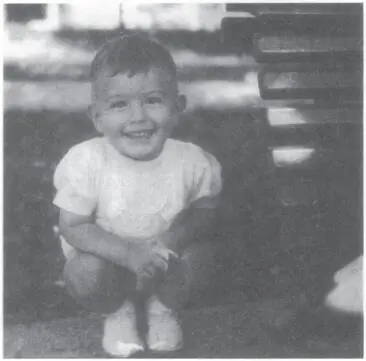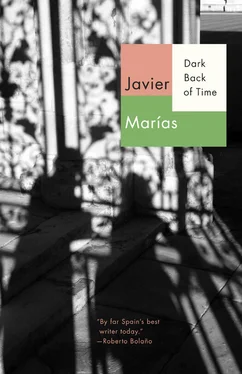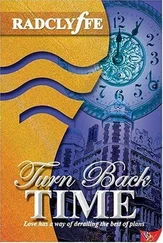Javier Marias - Dark Back of Time
Здесь есть возможность читать онлайн «Javier Marias - Dark Back of Time» весь текст электронной книги совершенно бесплатно (целиком полную версию без сокращений). В некоторых случаях можно слушать аудио, скачать через торрент в формате fb2 и присутствует краткое содержание. Год выпуска: 2012, Издательство: Vintage Espanol, Жанр: Современная проза, на английском языке. Описание произведения, (предисловие) а так же отзывы посетителей доступны на портале библиотеки ЛибКат.
- Название:Dark Back of Time
- Автор:
- Издательство:Vintage Espanol
- Жанр:
- Год:2012
- ISBN:нет данных
- Рейтинг книги:3 / 5. Голосов: 1
-
Избранное:Добавить в избранное
- Отзывы:
-
Ваша оценка:
- 60
- 1
- 2
- 3
- 4
- 5
Dark Back of Time: краткое содержание, описание и аннотация
Предлагаем к чтению аннотацию, описание, краткое содержание или предисловие (зависит от того, что написал сам автор книги «Dark Back of Time»). Если вы не нашли необходимую информацию о книге — напишите в комментариях, мы постараемся отыскать её.
Dark Back of Time — читать онлайн бесплатно полную книгу (весь текст) целиком
Ниже представлен текст книги, разбитый по страницам. Система сохранения места последней прочитанной страницы, позволяет с удобством читать онлайн бесплатно книгу «Dark Back of Time», без необходимости каждый раз заново искать на чём Вы остановились. Поставьте закладку, и сможете в любой момент перейти на страницу, на которой закончили чтение.
Интервал:
Закладка:


16
“It’s over now, there, there, it’s all over,” mothers often say to their children to calm them after a fright or a nightmare or some other woe, lending disproportionate importance to the present, almost as if to declare, “That which is not here now has never been.” Perhaps it’s understandable, intuition or memory tells us that for children the present is so strong every moment seems eternal and excludes whatever is not there in it, whatever is past or future, which is why children find it so hard to bear even the slightest setback or reversal, they believe them to be definitive; they see no more than the now they live embedded in, so if they’re hungry or thirsty or need to pee they cannot wait, they fly into a rage if there’s nothing to be done but get to a café or home to solve the enormous disruption, that’s how they experience any delay, even if it’s only two minutes long, they don’t know what a minute is, or an hour or a day, they don’t know what time is, they don’t understand that in fact it consists in just that, in passing and being lost, in its own passage and loss to the point of sometimes becoming impossible to remember. I’ve seen the same impatience or incomprehension of the passage of time in certain women, rarely in men, men seem to rely more on the future, and some of them even know that the future exists only to become the past.
When, as a child, I saw a movie that scared me or made me sad, I remember that my mother’s way of alleviating my fears also made use of the past if the story was historic, or appealed to fiction if it was invented. Still very young, I was greatly bothered by the film Lili , which I saw several times nevertheless, with Leslie Caron and Mel Ferrer, and by its melancholy song, and I was also frightened by one entitled Safari , I think, in which the Mau-Mau hordes killed a child, daughter of a none-too-bereaved Victor Mature — his expression was invariably one of disgust, whether during a kiss or at a funeral — nor was I at all entertained by one called Escape from Zahrain , with Yul Brynner and a gang of Arab terrorists who committed murder in the streets and marketplaces and made you think there was nowhere you would be safe, which is true enough (with terrorists), and another called The Secret Line , which some crazy babysitter took us to under false pretences, telling us it was about the subway; in the opening scene some gangsters threw a man who was pleading for his life out a skyscraper window, and I couldn’t get that scene out of my head for the rest of the film, about which I remember no more than that, and for several days more after that, I’m talking about when I was four or five years old. And in those cases of the Mau-Mau or Zahrain, seeing how I worried about what I had seen and how difficult it was to convince me that it was all made up, or out of a desire not to lie to her sons, my mother used to chase the clouds away by saying, “Yes, those things did happen once, but not any more, that was all before.” (So as not to lie to us about history, at least, perhaps in the spirit of the free-thinking Institución Libre de Enseñanza. With what scant inner conviction she must have said it, though, when during our war, not long before, she had seen people of all stripes fighting on both sides and her seventeen-year-old brother had been arrested and killed in cold blood in Madrid, and she had gone to all the police stations looking for him without knowing, fearful that he would be a corpse and she would find him like that, but it wasn’t even the body she found, only a picture of him, my uncle Emilio, dead, not much time for him either, only half the time there was for Wilfrid Ewart.) Before I was born was what this invariably meant to me, as if I needed to believe that I had arrived in the world just after it had finally calmed down. “Oh good,” I thought with practical relief, but that didn’t stop me from thinking about what had happened “before,” which I had seen with all the force that representations have, what had happened once could happen again, and it also seemed as if the past were still throbbing somewhere, it still seems that way to me, the ever-lengthening past. At other times, as with Lili and the other films that made me sad, however fanciful they were and however happily they ended, my mother tried to explain that the actors who suffered and died on the screen hadn’t really suffered or died at all; afterward they’d picked themselves up off the bed or the floor, had a good laugh together at what they had all just pretended to do — the living and the dead, good guys and bad guys, enemies and friends, an enviable general reconciliation — and went very happily home to dinner. Which helped us to keep from growing too sad without preventing us from feeling sorry for the characters and their story, it’s the fault of the representational dimension: it isn’t only that you know what is happening, you are present, so it’s hard to forget. That is where I began, I imagine, to differentiate between reality and fiction, and to learn that though they do coexist and are not mutually exclusive, they do not intermix, each travels across its own territory and both have great vitality. “Don’t be silly,” my mother would say if she saw me looking downcast or troubled by what I had witnessed in a dark theatre. “Don’t you see, that can’t happen now!” And she must have crossed her fingers as she said it, or silently commended herself to God.
It isn’t only that it can all happen now, it’s that I don’t know if in fact anything is really over or lost, at times I have the feeling that all the yesterdays are throbbing beneath the earth, refusing to disappear entirely, the enormous cumulation of the known and the unknown, stories told and stories silenced, recorded events and events that were never told or had no witnesses or were hidden, a vast mass of words and occurrences, passions, crimes, injustices, fear, laughter, aspirations and raptures, and above all thoughts: thoughts are what is most frequently passed on from one group of intruders and usurpers to another, down across the intruding and usurping generations, they are what survives longest and hardly changes and never concludes, like a permanent tumult beneath the earth’s thin crust where the infinite men and women who passed this way are buried or dispersed, most of them having spent much of their time in passive, idle, ordinary thoughts, but also in the more spirited ones that give some impetus to the indolent, weak wheel of the world, the desires and plots, expectations and rancors, beliefs and chimeras, pity and secrets and humiliations and quarrels, the revenges that are schemed, the rejected loves that arrive too late and the loves that never wear out: all are accompanied by their own thoughts which are experienced as unique by each newly-arrived reiterative individual who thinks them. But that is not all. The prestige of the present moment is based on this idea, which mothers hurry to inculcate as a consolation or subterfuge in their offspring: “that which no longer is, has never been.” Yet we may wonder whether the opposite isn’t the case, whether what has been goes on being indefinitely for the simple reason that it has been, even if it is only as part of the incessant, frenetic sum total of deeds and words whose tally no one takes the trouble to keep, even if it is only more glowing coals or fire for the ever-swelling seethe of thoughts which are thought and then scattered like infectious diseases to farther increase the “intolerable woe” of Middleton, the suicide. The fact that something has ceased doesn’t seem to be reason or force enough for it to be erased entirely, still less its effects, and least of all its inertia; the black cylinder of the zoetrope that belonged to Julianin, my brother, could be spun in its shaft again and again before it stopped, and even then it could be set back in motion, the horse and its rider galloping, then trotting, galloping, then trotting, watched one more time through the slits. Everything lasts too long, there’s no way to finish anything off, each thing that concludes enriches the soil for the following thing or for something else, unexpected and distant, and perhaps that’s why we grow so tired as we come to feel that our mothers’ precarious response, “It’s over now, there, there, it’s all over,” is by no means true. Nothing is over, nothing is there and nothing is over, and there is nothing that doesn’t resemble the slow relay of lights I see from my windows when I’m not sleeping or am already awake and look out at the plaza and the street with its early-rising women and men, their eyes still painted with traces of the dark night, their bodies still imbued with the clean or sweaty sheets that were shared or hogged. Or perhaps the man over there with the loose tie and incipient bluish stubble is heading for those sheets now, more as a matter of convention than out of a genuine desire for sleep, he hasn’t been to bed since yesterday. He’s waiting for the bus so early or so late, maybe without even enough money for a taxi, and looking at the streetlamps that still belong to the night he’s emerging from or hasn’t yet left, and in his mind are the many hours during which he had to abandon the bullfighters’ serious, ceremonious gambling den, you never know how luck will behave, not even when it gives you signals or resists, and especially when you have to find the money to hold on to the woman who’s waiting for you at home, fast asleep and heedless of your efforts and your fears, of which she is the cause. The man watches the streetlamps as the day dawns and gusts of wind blow against the back of his neck and ruffle up his hair, making him looks like a musician, and he has no faith that this relay of lights, when it is finally over, will diminish the night which, for him, is not confined to the sphere of bad dreams; he has forty-eight hours to find the money he owes, and he won’t find it, no chance, the worst ones aren’t the bullfighters, who can often be magnanimous, but the hangers-on and admirers and managers to whom he is in debt, the exploiters of artists are the least scrupulous of all exploiters because they believe themselves to be justified, perhaps they’re recouping their losses. The man looks at the streetlights thinking that maybe a knife thrust to the belly is the easiest way to give up the struggle to keep someone who wants to go but hasn’t yet left, maybe out of sorrow or because she hasn’t found her next handhold, it’s a question of time, sorrow is soon used up and rage takes its place, rage paid out with interest; handholds are everywhere, it’s only a matter of time until she sees them and tries one out, or until they catch sight of this woman who has been waving a red flag for some time now, calling out to them, and reaching out her arm to grab hold. It’s only a matter of time and the knife thrust secures it, that time, and then silence, and put out the light and then put it out. The woman watches the streetlamps while trying to protect her hair from the wind with a kerchief, an old-fashioned image not often seen any more, maybe that’s why she’s not very skilled at it and, not managing to tie the kerchief in place, she gives up, her hair flying in the wind like a banner. She has left the night behind, and her bed, and she thinks with some uneasiness about the young man still asleep there, he’s spent too many mornings there since he stayed on without ever saying he was staying, coming and going while she’s at work, leaving and returning whenever he feels like it with no explanations, as if he’d rented out a room and didn’t live with anyone, neither asking nor telling; but at night when he comes to bed in the darkness, far too late, he wakes her up like a hungry animal — like a child who can’t bear to wait — and tears off her nightgown and gets her sheets sweaty, taking up her time for rest, robbing her of her sleep to keep it for himself. The woman stays awake almost all night, thinking about what’s happened in the darkness and wondering if this was the last time, she leaves in the morning weary of her thoughts, fearful that when she comes back after all the hours in the world outside he’ll still be there, and fearful, too, that he’ll be gone; she fears both things equally and hasn’t even tried to tell him to stay or go because it also frightens her to think that he might listen to her, or that he might not, if she were to say one thing or the other, one thing and the other, if she dared. And she doesn’t know what to do so she doesn’t do anything, she just waits for the bus, chilled, watching the streetlamps hold out against the rising light of the sun as if it had nothing to do with them, during this time when their two territories coexist and do not exclude each other though they do not intermingle either, just as the real does not mix with the fictitious, and in fiction it can never be said, “It’s over now, there, there, it’s all over,” not even as consolation or subterfuge, because nothing has really happened, silly, and in the territory that is not truth’s everything goes on happening forever and ever and there the light is not put out now or later, and perhaps it is never put out.
Читать дальшеИнтервал:
Закладка:
Похожие книги на «Dark Back of Time»
Представляем Вашему вниманию похожие книги на «Dark Back of Time» списком для выбора. Мы отобрали схожую по названию и смыслу литературу в надежде предоставить читателям больше вариантов отыскать новые, интересные, ещё непрочитанные произведения.
Обсуждение, отзывы о книге «Dark Back of Time» и просто собственные мнения читателей. Оставьте ваши комментарии, напишите, что Вы думаете о произведении, его смысле или главных героях. Укажите что конкретно понравилось, а что нет, и почему Вы так считаете.












